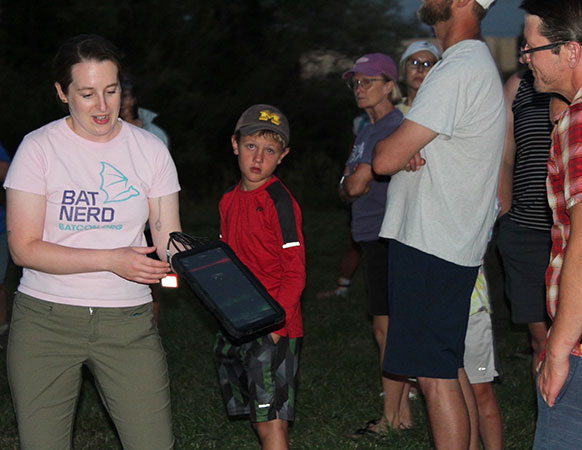UW’s Biodiversity Institute to Host Two Summer Bat Walks Around Wyoming
Published June 16, 2025

Mason Lee (left), senior project coordinator of the University of Wyoming Biodiversity Institute, explains the use of the Echo Meter Touch during last summer’s Sheridan Bat Walk. The instrument translates bat calls to a lower frequency that can be heard by people. Bat Walks this summer are scheduled in Sheridan July 20 and in Dubois Aug. 13. (Chris Vrba Photo)
Residents of two Wyoming towns will have a prime opportunity to view and hear bats during summer evenings.
The University of Wyoming Biodiversity Institute will host two free Summer Bat Walks, with walks currently scheduled in Dubois and Sheridan -- and the possibility of more to come.
“This will be our fifth year of Bat Walks in Sheridan at South Park Open Space, and our third year in Dubois, but we’ve been in a different spot in Dubois each year,” says Mason Lee, senior project coordinator of the Biodiversity Institute, who leads the walks. “Usually, when we’re visiting sites for the first time, we don’t know what the bat activity is going to look like for the Bat Walk, so it is fun to revisit sites where we know we usually have lots of bat activity. For example, we usually see bats foraging overhead on our Sheridan Bat Walk along the same stretch of river each year, which is exciting.”
Locations, dates and times of bat walks are as follows:
Sheridan -- South Park open space, Sunday, July 20, 8:30-10 p.m. This has been the location for previous bat walks in Sheridan.
Dubois -- Headwaters Arts and Conference Center, Wednesday, Aug. 13, 7-9:30 p.m. This event includes a 45-minute indoor presentation on bat ecology/biology, followed by a Bat Walk along the river.
Bats are invaluable to Wyoming and to ecosystems around the world. All bats in Wyoming -- of which there are 18 species -- are insectivores, and they eat a lot of crop pests. It is estimated that, in the U.S., bats save farmers $3 billion each year in pest control, Lee says. Insectivorous bats help protect crops, including corn, cotton, potatoes and wheat.
During previous Bat Walks, big brown bats, hoary bats and little brown myotis were those most often seen, but other species have often been spotted as well, says Lee, who is a certified Bat Walk Ambassador through Bat Conservation International (BCI).
BCI is an international, nongovernmental organization working to conserve the world’s bats and their habitats through conservation, research and education efforts. The Biodiversity Institute is the only certified Bat Walk Ambassador to offer this program in Wyoming. Bat Walks are designed to introduce communities to the amazing and beneficial flying mammals that live in their areas.
Most bats echolocate at a frequency that is too high for human ears. But a device, known as an Echo Meter Touch, that Lee takes on the walks “translates” their calls to a lower frequency that can be heard by people. For a recording of bats during a previous bat walk, go to https://vimeo.com/717518476.
“Our Echo Meter Touch picks up bat calls in the area, and the app translates those calls to a frequency that humans can hear,” Lee says.
Bats also have chatter or social calls, which they emit when they’re in bat boxes, which are artificial roosts. These chatter or social calls are at lower frequencies, which humans can sometimes hear, Lee says.
The Bat Walks are capped at 20 participants each.
“It’s easier to see and hear all of the bats when we have these smaller groups,” Lee says. “After the Dubois presentation, we will walk down to the riverside and use the bat detector to pick up any bats that are foraging along the river. The last time we were in Dubois, we watched a lot of bats foraging on insects above the river.”
To register for a Summer Bat Walk, go to https://wyomingbiodiversity.org/index.php/outreach/bat-walks.
Local organizations that would like to host Bat Walks in their community this summer can email biodiversity@uwyo.edu.
About the University of Wyoming Biodiversity Institute
The UW Biodiversity Institute fosters conservation of biodiversity through scientific discovery, creative dissemination, education and public engagement. In this setting, scientists, citizens, students and educators come together to share a wealth of perspectives on the study and appreciation of biodiversity -- from microbes to poetry and ecosystems to economics. Learn more at www.wyomingbiodiversity.org.

